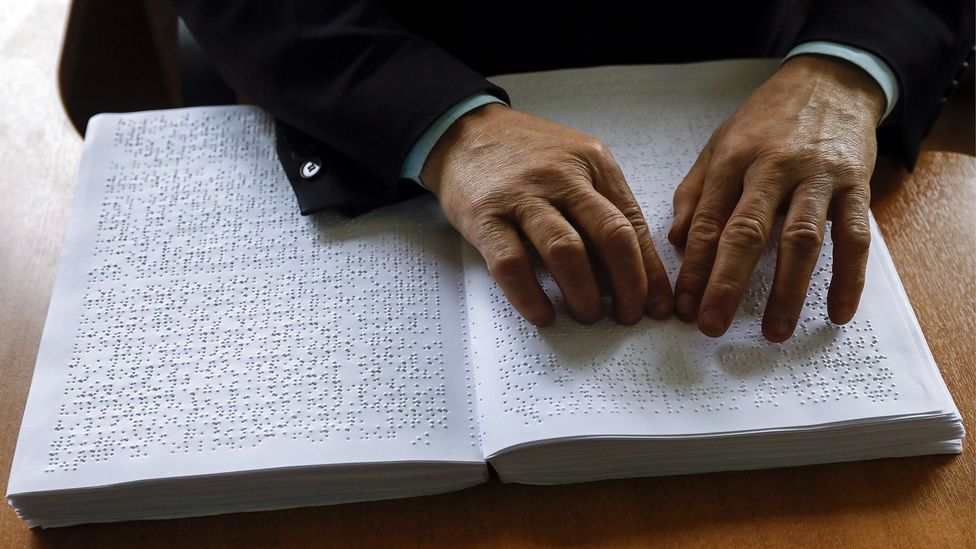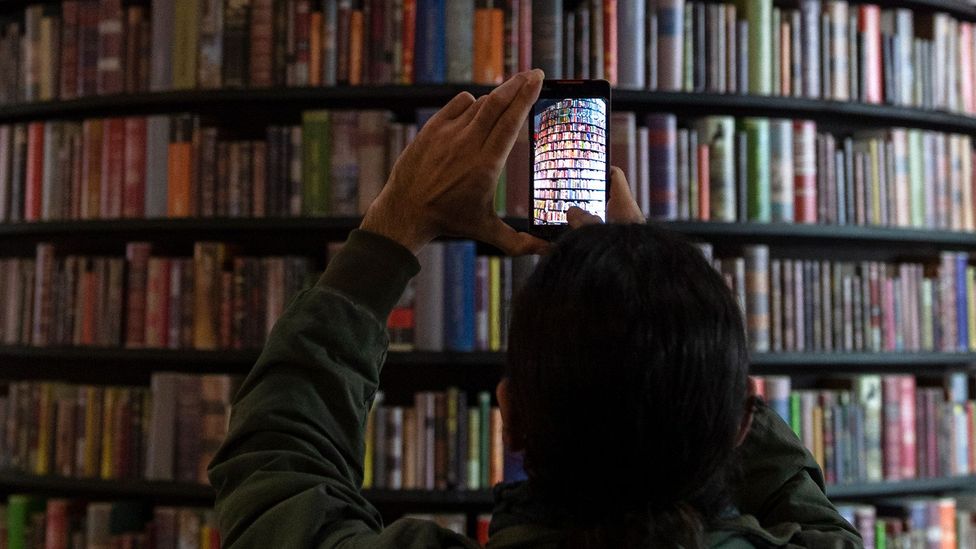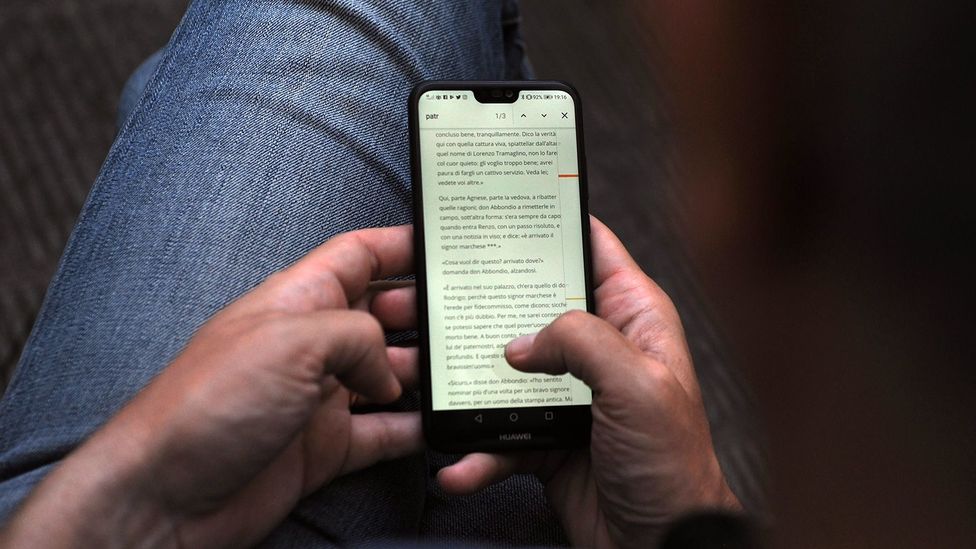Name for Feeling Like You Are in the Story You Are Reading
Does reading fiction brand us better people?
(Image credit:
Getty Images
)

Reading fiction has been said to increase people's empathy and compassion. But does the research actually bear that out?
Textual Healing is a flavour that explores the benefits of reading for mental health. Look out for stories on BBC Culture, BBC Reel and BBC Future and join BBC Culture'south Facebook group Textual Healing for more.
Every day more than one.8 meg books are sold in the United states of america and another one-half a million books are sold in the UK. Despite all the other like shooting fish in a barrel distractions available to us today, at that place'southward no dubiousness that many people yet dearest reading. Books tin can teach us plenty almost the globe, of class, as well as improving our vocabularies and writing skills. But tin can fiction likewise make us better people?
The claims for fiction are great. It's been credited with everything from an increment in volunteering and charitable giving to the trend to vote – and even with the gradual decrease in violence over the centuries.
Characters hook us into stories. Aristotle said that when we watch a tragedy two emotions predominate: compassion (for the character) and fearfulness (for yourself). Without necessarily even noticing, we imagine what it'south like to be them and compare their reactions to situations with how we responded in the past, or imagine we might in the futurity.
You might as well similar:
• Tin can reading ameliorate your mental wellness?
• How feeling bad changes the encephalon
• The amazing benefits of being bilingual
This exercise in perspective-taking is like a training course in agreement others. The Canadian cognitive psychologist Keith Oatley calls fiction "the listen's flight simulator". Just as pilots tin can do flying without leaving the ground, people who read fiction may improve their social skills each time they open a novel. In his enquiry, he has found that as we brainstorm to identify with the characters, we get-go to consider their goals and desires instead of our own. When they are in danger, our hearts start to race. Nosotros might even gasp. Simply we read with luxury of knowing that none of this is happening to u.s.. We don't moisture ourselves with terror or bound out of windows to escape.

Fiction has been called "the mind's flight simulator" (Credit: Getty Images)
Having said that, some of the neural mechanisms the brain uses to make sense of narratives in stories do share similarities with those used in existent-life situations. If nosotros read the word "kicking", for example, areas of the brain related to physically boot are activated. If we read that a character pulled a light string, activity increases in the region of the brain associated with grasping.
To follow a plot, nosotros demand to know who knows what, how they feel about information technology and what each character believes others might exist thinking. This requires the skill known as "theory of listen". When people read about a character's thoughts, areas of the brain associated with theory of mind are activated.

When people read near a graphic symbol's thoughts, areas of the brain associated with theory of mind are activated (Credit: Getty Images)
With all this practice in empathising with other people through reading, you lot would call up information technology would exist possible to demonstrate that those who read fiction have meliorate social skills than those who read mostly non-fiction or don't read at all.
The difficulty with conducting this kind of research is that many of us have a tendency to exaggerate the number of books we've read. To get around this, Oatley and colleagues gave students a listing of fiction and non-fiction writers and asked them to signal which writers they had heard of. They warned them that a few fake names had been thrown in to cheque they weren't lying. The number of writers people have heard of turns out to be a good proxy for how much they actually read.

Many of us tend to exaggerate the number of books we've read (Credit: Getty Images)
Side by side, Oatley'due south squad gave people the "Mind in the Eyes" exam, where you are given a series of photographs of pairs of eyes. From the eyes and surrounding skin alone, your task is to divine which emotion a person is feeling. Yous are given a brusk list of options like shy, guilty, daydreaming or worried. The expressions are subtle and at first glance might announced neutral, so information technology'south harder than information technology sounds. But those accounted to have read more fiction than not-fiction scored higher on this test – likewise as on a calibration measuring interpersonal sensitivity.
At the Princeton Social Neuroscience Lab, psychologist Diana Tamir has demonstrated that people who often read fiction have amend social cognition. In other words, they're more skilled at working out what other people are thinking and feeling. Using encephalon scans, she has plant that while reading fiction, there is more activity in parts of the default manner network of the brain that are involved in simulating what other people are thinking.

People who oftentimes read fiction have greater social noesis (Credit: Getty Images)
People who read novels appear to be better than average at reading other people's emotions, merely does that necessarily make them meliorate people? To test this, researchers at used a method many a psychology student has tried at some indicate, where you "accidentally" driblet a bunch of pens on the floor and and so encounter who offers to assistance you gather them up. Before the pen-drop took place participants were given a mood questionnaire interspersed with questions measuring empathy. So they read a short story and answered a series of questions about to the extent they had felt transported while reading the story. Did they have a vivid mental flick of the characters? Did they want to learn more than most the characters after they'd finished the story?
The experimenters then said they needed to fetch something from another room and, oops, dropped six pens on the way out. It worked: the people who felt the near transported past the story and expressed the most empathy for the characters were more probable to help retrieve the pens.
You might exist wondering whether the people who cared the most well-nigh the characters in the story were the kinder people in the first place – as in, the type of people who would offer to help others. But the authors of the study took into account people'due south scores for empathy and found that, regardless, those who were near transported by the story behaved more altruistically.

In one experiment, people who felt most transported by a story later behaved more altruistically (Credit: Getty Images)
Of form, experiments are one thing. Before we extrapolate to wider society we need to exist careful almost the direction of causality. In that location is always the possibility that in real life, people who are more than empathic in the first place are more interested in other people's interior lives and that this involvement draws them towards reading fiction. It'due south not an like shooting fish in a barrel topic to research: the ideal study would involving measuring people'due south empathy levels, randomly allocating them either to read numerous novels or none at all for many years, and and so measuring their empathy levels once more to see whether reading novels had made any deviation.
Instead, short-term studies have been done. For example, Dutch researchers arranged for students to read either newspaper articles well-nigh riots in Greece and liberation mean solar day in the Netherlands or the showtime chapter from Nobel Prize winner Jose Saramago'southward novel Blindness. In this story, a human is waiting in his car at traffic lights when he suddenly goes bullheaded. His passengers bring him domicile and a passer-past promises to bulldoze his car home for him, but instead he steals information technology. When students read the story, not simply did their empathy levels rise immediately later on, but provided they had felt emotionally transported by the story, a calendar week after they scored fifty-fifty higher on empathy than they did correct after reading.
Of form, you could debate that fiction isn't alone in this. Nosotros tin can empathise with people we see in news stories as well, and hopefully we oftentimes do. Only fiction has at least three advantages. We have access to the graphic symbol's interior earth in a way nosotros normally do not with journalism, and we are more likely to willingly append atheism without questioning the veracity of what people are saying. Finally, novels allow u.s.a. to do something that is difficult to do in our ain lives, which is to view a character's life over many years.

Some institutions consider reading to be so meaning that they include modules on literature (Credit: Getty Images)
So the research shows that perhaps reading fiction does make people conduct better. Certainly some institutions consider the effects of reading to exist and then significant that they now include modules on literature. At the University of California Irvine, for case, Johanna Shapiro from the Department of Family Medicine firmly believes that reading fiction results in meliorate doctors and has led the establishment of a humanities program to train medical students.
Information technology sounds equally though it's time to lose the stereotype of the shy bookworm whose olfactory organ is always in a book because they notice it hard to deal with real people. In fact, these bookworms might be amend than everyone else at understanding human beings.
Textual Healingis a flavor that explores the benefits of reading for mental health. Await out for stories on BBC Culture, BBC Reel and BBC Time to come and join BBC Culture's Facebook group Textual Healingfor more.
Join more one 1000000 Futurity fans by liking u.s. on Facebook , or follow us on Twitter or Instagram .
If you liked this story, sign up for the weekly bbc.com features newsletter , chosen "If You Only Read 6 Things This Week". A handpicked selection of stories from BBC Time to come, Civilization, Uppercase, and Travel, delivered to your inbox every Friday.
Source: https://www.bbc.com/future/article/20190523-does-reading-fiction-make-us-better-people
0 Response to "Name for Feeling Like You Are in the Story You Are Reading"
Postar um comentário